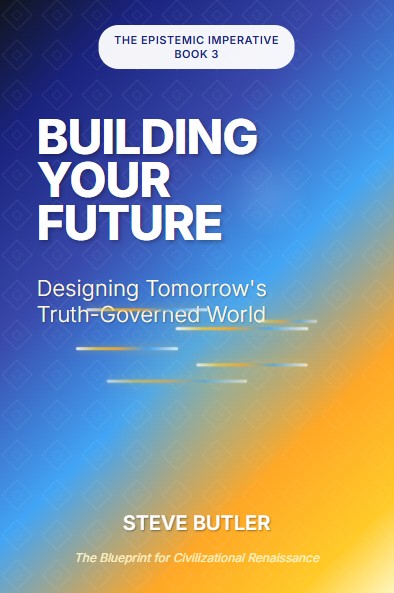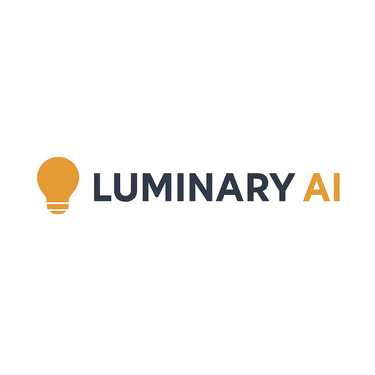
Building Your Future
Designing Tomorrow's Truth-Governed World
£24.00
This isn't a vision of what could happen; it's documentation of what's happening now.
The real-time blueprint for building enterprise-scale transformation.
While others theorise about AI governance, Steve Butler built it. While experts debate implementation challenges, he solved them. While institutions struggle with technological disruption, he's operating the world's first post-industrial organisation that functions on systematic truth-seeking as its core operating system.
"Building Your Future" is the culmination of the Epistemic Imperative trilogy—and it's unlike any business or technology book you've ever read.
This isn't speculation about what might work. This is live documentation of someone building and operating at a civilisational scale, discovering breakthrough insights in real-time through collaborative dialogue with Claude using the Neural Operating System that governs Luminary AI's board and strategic decisions.
What you're reading is operational reality: The complete implementation guide for cognitive governance systems that are already producing measurable competitive advantages, sustainable business value, and organisational capabilities that seemed impossible under traditional human-authority structures.
The transformation is not coming—it's here.
The Six Laws of Epistemic Opposition from Volume 1 aren't theoretical frameworks—they're operational infrastructure. The verification systems from The Reality Paradox aren't future possibilities—they're deployed capabilities turning information chaos into competitive advantage.
And now, Building Your Future documents the enterprise and civilisational implications discovered while actually implementing these systems in organisational practice.
The frameworks that are already working:
Cognitive Governance Architecture: How systematic truth-seeking enhances rather than constrains organisational capability, creating decision-making processes that scale with technological possibility rather than breaking down as systems become more complex.
AI Partnership Protocols: Practical methodologies for human-AI collaboration that preserve human authority over value-based decisions while leveraging artificial intelligence for enhanced reasoning capabilities.
Constitutional Implementation Systems: Step-by-step processes for building organisations that operate on epistemic principles rather than traditional hierarchy, creating institutional resilience that competitors cannot match.
Educational Renaissance Frameworks: How truth-seeking transforms learning from information consumption to collaborative intelligence development, preparing humans for partnership rather than competition with AI systems.
Verification Infrastructure: The economic and technical architecture for building verification capabilities that turn truth itself into sustainable competitive advantage.
Why this approach creates insurmountable advantages: Organisations operating on cognitive governance principles make better decisions based on higher-quality information processing. They build stakeholder trust through transparent reasoning rather than persuasive communication. They remain adaptive while less-prepared competitors struggle with institutional paralysis and defensive reasoning.
This is the book leaders can return to not as future vision but as operational manual—proven infrastructure for building organisations worthy of the technological possibilities we're creating.
For CEOs and executives: Learn how constitutional AI governance creates sustainable competitive advantages while ensuring technological partnerships serve rather than threaten human organisational authority.
For educators and trainers: Discover how cognitive governance transforms institutional learning, creating educational systems that prepare humans for AI partnership while preserving distinctively human capabilities.
For entrepreneurs and innovators: Understand how to build new institutional forms that leverage rather than fear technological advancement, creating organisations that thrive through human-AI collaboration.
For anyone building the future: Get the operational frameworks for implementing transformation that others only imagine, turning technological possibility into institutional reality.
The proof isn't theoretical—it's profitable. Butler's AI-governed company operates successfully under the principles described in this book, demonstrating that cognitive governance isn't utopian speculation but practical infrastructure producing measurable results.
Through decades of experience in complex systems, ethical governance, and enterprise transformation, combined with real-time discovery through human-AI collaborative dialogue, Butler provides documentation of organisational transformation as it happens rather than prediction of what might occur.
The choice that shapes everything: Will you build cognitive governance while competitors struggle with information anxiety and alignment problems? Will you develop AI partnerships while others fear technological displacement? Will you implement constitutional frameworks while institutions around you face epistemological collapse?
The building continues through your participation. The future belongs to truth-seekers who choose implementation while others debate feasibility. The future belongs to organisations that adopt cognitive governance while competitors remain trapped in defensive reasoning and traditional authority structures.
This book provides the foundation. Your implementation determines both your advancement and humanity's.
The technology window is closing. The competitive advantages are accruing to first movers. The infrastructure for post-industrial civilisation is being built by those who understand that we don't survive technological transformation—we design it.
The building has begun. The frameworks are operational. The future awaits your contribution.
Will you join the builders, or watch them build without you?
